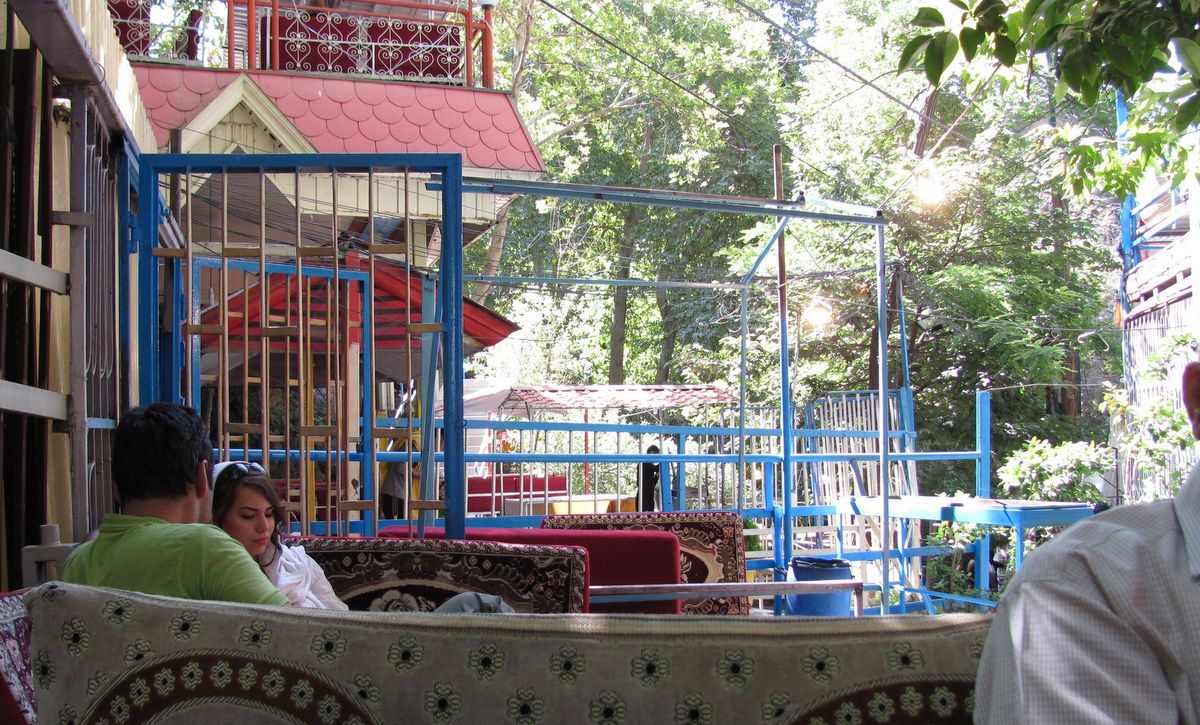Iran 1st-Hand: A Country of Resignation (Slavin)
 Cafe in Darband (Photo: Barbara Slavin/Al-Monitor)Barbara Slavin, who was in Iran to cover the Non-Aligned Movement's summit, writes for Al-Monitor after a week of observation:
Cafe in Darband (Photo: Barbara Slavin/Al-Monitor)Barbara Slavin, who was in Iran to cover the Non-Aligned Movement's summit, writes for Al-Monitor after a week of observation:
Cool breezes wafted through the trees and water gushed down the mountainside as young Iranians sipped tea and leaned against cushions on raised wooden platforms known as a takht-e choobi.
Taking advantage of an unexpected three-day holiday provided by the government last week to reduce traffic and improve security for a summit of Non-aligned nations, Tehranis flocked to the city's Darband neighborhood, one of several popular places in the foothills of the Alborz mountains that cradle the Iranian capital from the north. Such mountain retreats provide an inexpensive escape from the summer heat and pollution — as well as from the social restrictions of the Islamic Republic that forbid unrelated men and women from spending un-chaperoned time together.
These days, Iranians need such diversions more than ever.
Sanctions and economic mismanagement have cut the value of the local currency, the rial, compared to the dollar, so that the average monthly salary is worth only $500 compared to $1,000 a year ago. That makes it hard to pay rent of $100 or more for a tiny apartment, to buy chicken that costs $2 a pound, tomatoes that go for 50 cents a pound or gasoline at $3.50 a liter.
Israeli threats to attack Iran’s nuclear installations are also weighing on Iranian minds — even if officials such as parliamentary Speaker Ali Larijani dismiss the notion of such an attack as “suicidal” for Israel. For an American returning to Tehran after four years, what is most striking, however, is the growing feeling that life will not get better anytime soon. Iran seems to have become a nation of Scarlet O’Hara’s who live for today and try not to think about the future.
“We may as well enjoy life because who knows what will happen tomorrow?” was the way one Tehrani put it. The speaker, like others interviewed by Al-Monitor last week, is not being named to minimize chances for government retribution.
This pessimism contrasts with sentiment in the 1990s and early 2000s that Iran could overcome its post-Islamic Revolution difficulties. Iranians who left the country before the 1979 overthrow of the secular shah or during the 1980-88 Iran-Iraq war began returning in the '90s to reclaim property, see relatives and start businesses. Adult children of diaspora Iranians came back to work for foreign companies eager to buy Iranian oil and sell manufactured goods to a growing middle class.
Under the presidency of Mahmoud Ahmadinejad, however, the direction of the flow has reversed. Now even blue-collar workers — many of them laid off by employers who can no longer import materials from European companies spooked by American sanctions — are contemplating getting out.
“This country is broken,” said a parent of one such worker inquiring about how to get a US or Canadian visa.
 Al-Monitor,
Al-Monitor,  Barbara Slavin
Barbara Slavin 
Reader Comments